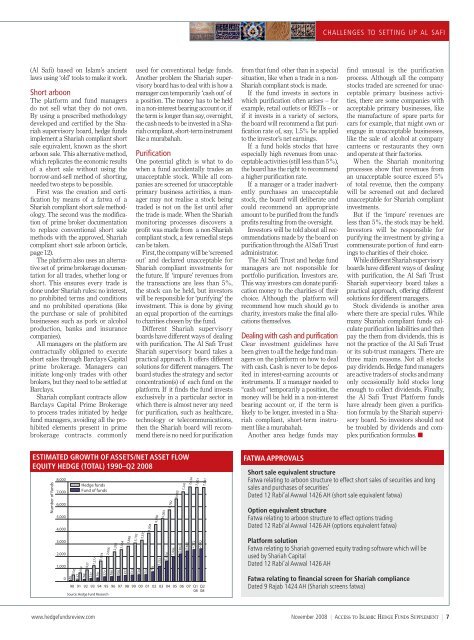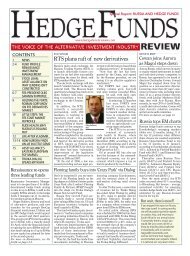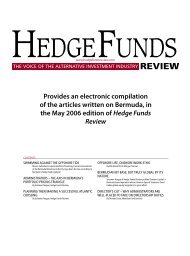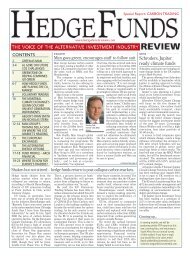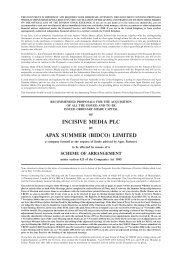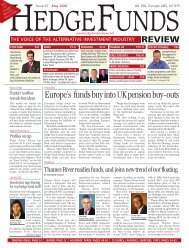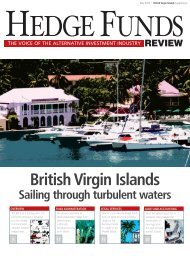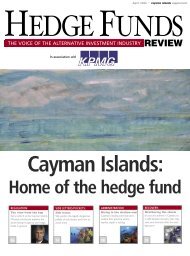Access to Islamic Hedge Funds - Incisive Media
Access to Islamic Hedge Funds - Incisive Media
Access to Islamic Hedge Funds - Incisive Media
Create successful ePaper yourself
Turn your PDF publications into a flip-book with our unique Google optimized e-Paper software.
challenges <strong>to</strong> setting up al safi<br />
(Al Safi) based on Islam’s ancient<br />
laws using ‘old’ <strong>to</strong>ols <strong>to</strong> make it work.<br />
Short arboon<br />
The platform and fund managers<br />
do not sell what they do not own.<br />
By using a prescribed methodology<br />
developed and certified by the Shariah<br />
supervisory board, hedge funds<br />
implement a Shariah compliant short<br />
sale equivalent, known as the short<br />
arboon sale. This alternative method,<br />
which replicates the economic results<br />
of a short sale without using the<br />
borrow-and-sell method of shorting,<br />
needed two steps <strong>to</strong> be possible.<br />
First was the creation and certification<br />
by means of a fatwa of a<br />
Shariah compliant short sale methodology.<br />
The second was the modification<br />
of prime broker documentation<br />
<strong>to</strong> replace conventional short sale<br />
methods with the approved, Shariah<br />
compliant short sale arboon (article,<br />
page 12).<br />
The platform also uses an alternative<br />
set of prime brokerage documentation<br />
for all trades, whether long or<br />
short. This ensures every trade is<br />
done under Shariah rules: no interest,<br />
no prohibited terms and conditions<br />
and no prohibited operations (like<br />
the purchase or sale of prohibited<br />
businesses such as pork or alcohol<br />
production, banks and insurance<br />
companies).<br />
All managers on the platform are<br />
contractually obligated <strong>to</strong> execute<br />
short sales through Barclays Capital<br />
prime brokerage. Managers can<br />
initiate long-only trades with other<br />
brokers, but they need <strong>to</strong> be settled at<br />
Barclays.<br />
Shariah compliant contracts allow<br />
Barclays Capital Prime Brokerage<br />
<strong>to</strong> process trades initiated by hedge<br />
fund managers, avoiding all the prohibited<br />
elements present in prime<br />
brokerage contracts commonly<br />
used for conventional hedge funds.<br />
Another problem the Shariah supervisory<br />
board has <strong>to</strong> deal with is how a<br />
manager can temporarily ‘cash out’ of<br />
a position. The money has <strong>to</strong> be held<br />
in a non-interest bearing account or, if<br />
the term is longer than say, overnight,<br />
the cash needs <strong>to</strong> be invested in a Shariah<br />
compliant, short-term instrument<br />
like a murabahah.<br />
Purification<br />
One potential glitch is what <strong>to</strong> do<br />
when a fund accidentally trades an<br />
unacceptable s<strong>to</strong>ck. While all companies<br />
are screened for unacceptable<br />
primary business activities, a manager<br />
may not realise a s<strong>to</strong>ck being<br />
traded is not on the list until after<br />
the trade is made. When the Shariah<br />
moni<strong>to</strong>ring processes discovers a<br />
profit was made from a non-Shariah<br />
compliant s<strong>to</strong>ck, a few remedial steps<br />
can be taken.<br />
First, the company will be ‘screened<br />
out’ and declared unacceptable for<br />
Shariah compliant investments for<br />
the future. If ‘impure’ revenues from<br />
the transactions are less than 5%,<br />
the s<strong>to</strong>ck can be held, but inves<strong>to</strong>rs<br />
will be responsible for ‘purifying’ the<br />
investment. This is done by giving<br />
an equal proportion of the earnings<br />
<strong>to</strong> charities chosen by the fund.<br />
Different Shariah supervisory<br />
boards have different ways of dealing<br />
with purification. The Al Safi Trust<br />
Shariah supervisory board takes a<br />
practical approach. It offers different<br />
solutions for different managers. The<br />
board studies the strategy and sec<strong>to</strong>r<br />
concentration(s) of each fund on the<br />
platform. If it finds the fund invests<br />
exclusively in a particular sec<strong>to</strong>r in<br />
which there is almost never any need<br />
for purification, such as healthcare,<br />
technology or telecommunications,<br />
then the Shariah board will recommend<br />
there is no need for purification<br />
from that fund other than in a special<br />
situation, like when a trade in a non-<br />
Shariah compliant s<strong>to</strong>ck is made.<br />
If the fund invests in sec<strong>to</strong>rs in<br />
which purification often arises – for<br />
example, retail outlets or REITs – or<br />
if it invests in a variety of sec<strong>to</strong>rs,<br />
the board will recommend a flat purification<br />
rate of, say, 1.5% be applied<br />
<strong>to</strong> the inves<strong>to</strong>r’s net earnings.<br />
If a fund holds s<strong>to</strong>cks that have<br />
especially high revenues from unacceptable<br />
activities (still less than 5%),<br />
the board has the right <strong>to</strong> recommend<br />
a higher purification rate.<br />
If a manager or a trader inadvertently<br />
purchases an unacceptable<br />
s<strong>to</strong>ck, the board will deliberate and<br />
could recommend an appropriate<br />
amount <strong>to</strong> be purified from the fund’s<br />
profits resulting from the oversight.<br />
Inves<strong>to</strong>rs will be <strong>to</strong>ld about all recommendations<br />
made by the board on<br />
purification through the Al Safi Trust<br />
administra<strong>to</strong>r.<br />
The Al Safi Trust and hedge fund<br />
managers are not responsible for<br />
portfolio purification. Inves<strong>to</strong>rs are.<br />
This way inves<strong>to</strong>rs can donate purification<br />
money <strong>to</strong> the charities of their<br />
choice. Although the platform will<br />
recommend how much should go <strong>to</strong><br />
charity, inves<strong>to</strong>rs make the final allocations<br />
themselves.<br />
Dealing with cash and purification<br />
Clear investment guidelines have<br />
been given <strong>to</strong> all the hedge fund managers<br />
on the platform on how <strong>to</strong> deal<br />
with cash. Cash is never <strong>to</strong> be deposited<br />
in interest-earning accounts or<br />
instruments. If a manager needed <strong>to</strong><br />
“cash out” temporarily a position, the<br />
money will be held in a non-interest<br />
bearing account or, if the term is<br />
likely <strong>to</strong> be longer, invested in a Shariah<br />
compliant, short-term instrument<br />
like a murabahah.<br />
Another area hedge funds may<br />
find unusual is the purification<br />
process. Although all the company<br />
s<strong>to</strong>cks traded are screened for unacceptable<br />
primary business activities,<br />
there are some companies with<br />
acceptable primary businesses, like<br />
the manufacture of spare parts for<br />
cars for example, that might own or<br />
engage in unacceptable businesses,<br />
like the sale of alcohol at company<br />
canteens or restaurants they own<br />
and operate at their fac<strong>to</strong>ries.<br />
When the Shariah moni<strong>to</strong>ring<br />
processes show that revenues from<br />
an unacceptable source exceed 5%<br />
of <strong>to</strong>tal revenue, then the company<br />
will be screened out and declared<br />
unacceptable for Shariah compliant<br />
investments.<br />
But if the ‘impure’ revenues are<br />
less than 5%, the s<strong>to</strong>ck may be held.<br />
Inves<strong>to</strong>rs will be responsible for<br />
purifying the investment by giving a<br />
commensurate portion of fund earnings<br />
<strong>to</strong> charities of their choice.<br />
While different Shariah supervisory<br />
boards have different ways of dealing<br />
with purification, the Al Safi Trust<br />
Shariah supervisory board takes a<br />
practical approach, offering different<br />
solutions for different managers.<br />
S<strong>to</strong>ck dividends is another area<br />
where there are special rules. While<br />
many Shariah compliant funds calculate<br />
purification liabilities and then<br />
pay the them from dividends, this is<br />
not the practice of the Al Safi Trust<br />
or its sub-trust managers. There are<br />
three main reasons. Not all s<strong>to</strong>cks<br />
pay dividends. <strong>Hedge</strong> fund managers<br />
are active traders of s<strong>to</strong>cks and many<br />
only occasionally hold s<strong>to</strong>cks long<br />
enough <strong>to</strong> collect dividends. Finally,<br />
the Al Safi Trust Platform funds<br />
have already been given a purification<br />
formula by the Shariah supervisory<br />
board. So inves<strong>to</strong>rs should not<br />
be troubled by dividends and complex<br />
purification formulas. n<br />
estimated growth of assets/net asset flow<br />
equity hedge (<strong>to</strong>tal) 1990–Q2 2008<br />
Number of funds<br />
8,000<br />
7,000<br />
6,000<br />
5,000<br />
4,000<br />
3,000<br />
2,000<br />
1,000<br />
0<br />
80 530<br />
127 694<br />
168 937<br />
<strong>Hedge</strong> funds<br />
Fund of funds<br />
237 1,277<br />
291 1,654<br />
377 2,006<br />
426 2,564<br />
389 2,392<br />
477<br />
2,848<br />
515<br />
3,102<br />
538<br />
90 91 92 93 94 95 96 97 98 99 00 01 02 03 04 05 06 07 Q1 Q2<br />
08 08<br />
Source: <strong>Hedge</strong> Fund Research<br />
3,335<br />
550<br />
3,904<br />
781<br />
4,598<br />
1,232<br />
5,065<br />
5,782<br />
6,665<br />
7,241<br />
7,634<br />
1,654<br />
1,996<br />
2,462<br />
2,462<br />
2,572<br />
7,601<br />
2,642<br />
7,591<br />
fatwa approvals<br />
Short sale equivalent structure<br />
Fatwa relating <strong>to</strong> arboon structure <strong>to</strong> effect short sales of securities and long<br />
sales and purchases of securities’<br />
Dated 12 Rabi’al Awwal 1426 AH (short sale equivalent fatwa)<br />
Option equivalent structure<br />
Fatwa relating <strong>to</strong> arboon structure <strong>to</strong> effect options trading<br />
Dated 12 Rabi’al Awwal 1426 AH (options equivalent fatwa)<br />
Platform solution<br />
Fatwa relating <strong>to</strong> Shariah governed equity trading software which will be<br />
used by Shariah Capital<br />
Dated 12 Rabi’al Awwal 1426 AH<br />
Fatwa relating <strong>to</strong> financial screen for Shariah compliance<br />
Dated 9 Rajab 1424 AH (Shariah screens fatwa)<br />
www.hedgefundsreview.com<br />
November 2008 | <strong>Access</strong> <strong>to</strong> <strong>Islamic</strong> <strong>Hedge</strong> <strong>Funds</strong> Supplement |


